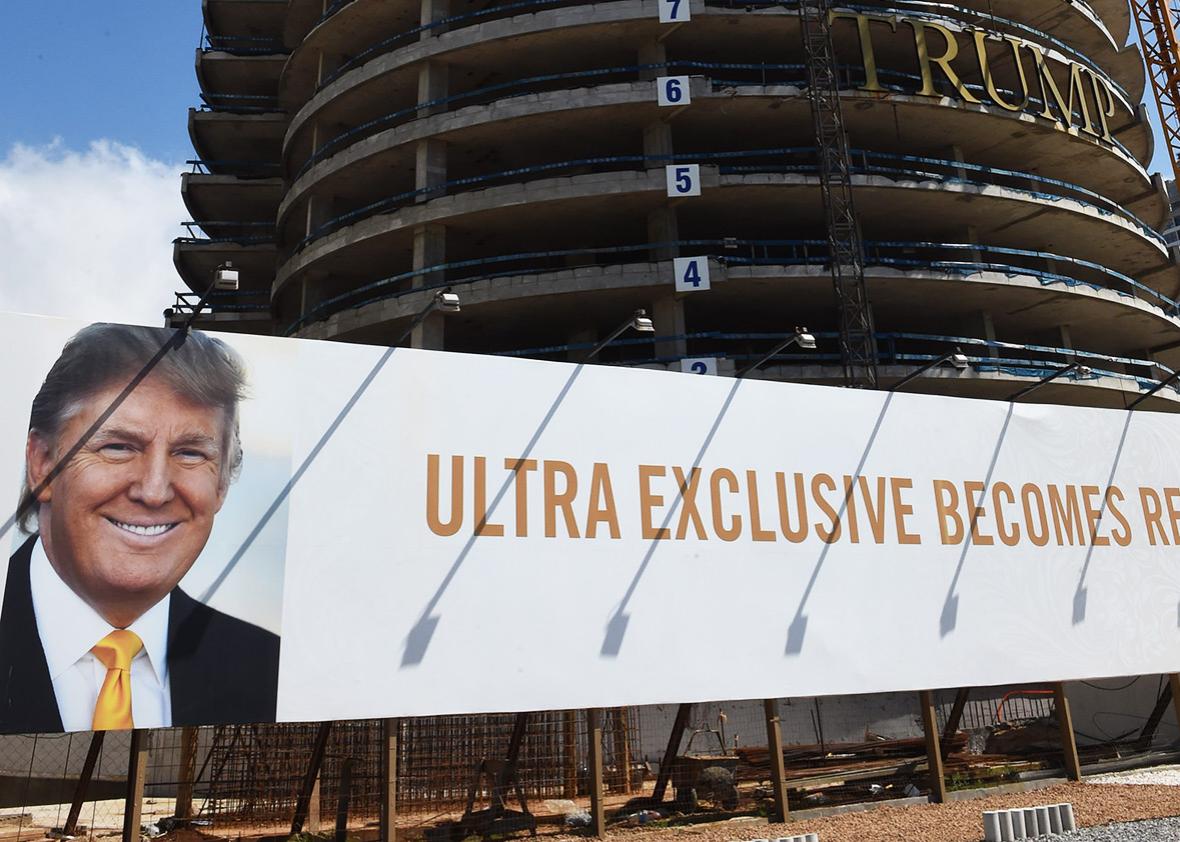Early last month, two weeks before he’d watch his father be sworn in as president, Eric Trump traveled to a seaside town in Uruguay to help sell condos that bear his family’s name. The younger of President Trump’s two adult sons was accompanied by a Secret Service detail and joined on site by State Department staff, which together gave the business trip the unmistakable gloss of a diplomatic one. It also cost U.S. taxpayers nearly $100,000 in hotels alone.
That last detail—reported by the Washington Post on Friday—makes crystal clear that the federal government will be forced to spend money every time one of Trump’s adult sons heads out the door on business for a company owned by the president. President Trump’s conflicts, then, are more than just a massive ethical problem; they’re now a massive ethical problem that the American taxpayers are paying to help maintain.
According to records reviewed by the Post, the government’s hotel bill for the trip totaled $97,830—$88,320 for the Secret Service and another $9,510 for the embassy staff the State Department says provided unspecified “support” during the visit. It stands to reason that the security detail also incurred additional costs, though details remain scarce. The Secret Service, the State Department, the White House, and the Trump Organization all declined to provide key information about the trip to the Post, including basic details like how long Eric Trump was actually in the country. (Local press reports suggest his stay may have been as short as two nights.) This was not a one-off trip, either. Eric and his brother, Don Jr., are set to travel to Canada later this month for the grand opening of the new Trump International Hotel & Tower in Vancouver, British Columbia. Secret Service will almost certainly follow.
In some ways, this story is not unique. Members of the first family have long received Secret Service protection, which means taxpayers by necessity pay when one of them travels abroad. (The government pays for those doing the protecting but not the person being protected. The Trump Organization or its business partners, then, most likely covered Eric’s travel costs.) What makes this different, though, is that the purpose of Eric’s trip wasn’t simply for his own sake—but explicitly for the president’s as well. The trip, after all, was taken both literally and figuratively in his father’s name. The most infuriating part, then, is not what American taxpayers are losing, but what Trump is gaining.
Donald Trump made a big show before taking office about separating himself from his company, but it was just that: a show. According to documents made public late last week through a Freedom of Information Act request by ProPublica, we now know that the newly created Donald J. Trump Revocable Trust is for the “exclusive benefit” of one Donald J. Trump. The president will continue to receive reports on his company’s profits or losses while in office, and he also retains the right to fire either of his sons at any time despite his suggestion to the contrary.
The president doesn’t own the Uruguayan condo development, but he licensed his name to it and, according to his most recent financial disclosure, received somewhere between $100,000 and $1 million in royalties for doing so. For competitive reasons, businesses do their best to keep the specifics of such licensing deals private, but court records have shown that similar deals Trump has struck in the past were structured in such a way where his pay increased along with the building’s occupancy. The 26-story, Trump-branded apartment building in Uruguay is slated to be finished by late 2018, but its condos are already selling for between $550,000 and $8 million. According to the developer behind the project, the average unit price has climbed 30 to 35 percent in the past year. So that means the American taxpayers are shelling out upward of $100,000 so that their president’s company and its partners can make even more.
The Trump Organization has promised not to enter into any “new” foreign deals while its namesake is in the White House, but it is pushing forward with existing ones. Its partners, meanwhile, aren’t even pretending that they don’t benefit from being in business with the president. In interviews with the Associated Press last month, both the developer building the luxury high-rise in Uruguay and the company selling its units made that reality part of their actual sales pitches. “I have no doubt that it is going to be finished,” Talma Friedler, whose New Home Properties sells units in the building, told the AP shorty before Inauguration Day, “and even more so because he’s going to be president of the United States.” And now he is.
Know anything about the Trump Organization? DM Josh Voorhees on Twitter, or email him at josh.voorhees@slate.com.
*Correction, Feb. 6, 2017: Due to a photo provider error, the photo caption on this post originally misspelled Punta del Este, Uruguay.
